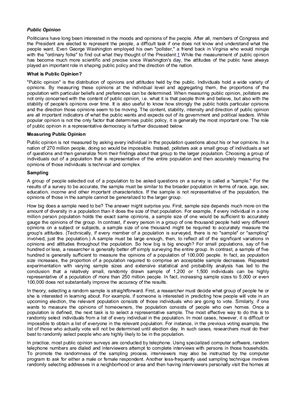New York, 2007
Public Opinion
Politicians have long been interested in the moods and opinions of the people. After all, members of Congress and the President are elected to represent the people, a difficult task if one does not know and understand what the people want. Even George Washington employed his own "pollster," a friend back in Virginia who would mingle with the "ordinary folks" to find out what they thought of the President.1 While the measurement of public opinion has become much more scientific and precise since Washington's day, the attitudes of the public have always played an important role in shaping public policy and the direction of the nation.
Public Opinion
Politicians have long been interested in the moods and opinions of the people. After all, members of Congress and the President are elected to represent the people, a difficult task if one does not know and understand what the people want. Even George Washington employed his own "pollster," a friend back in Virginia who would mingle with the "ordinary folks" to find out what they thought of the President.1 While the measurement of public opinion has become much more scientific and precise since Washington's day, the attitudes of the public have always played an important role in shaping public policy and the direction of the nation.

